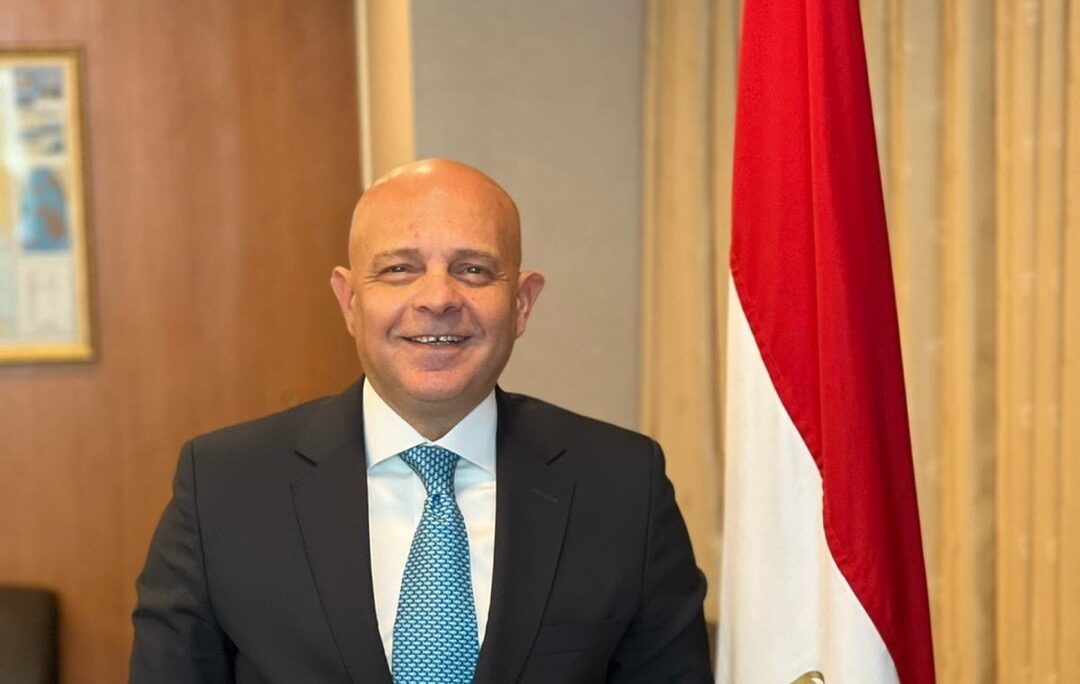Egyptian ambassador stresses deeper mutual benefits of defense, infrastructure and industrial cooperation between Seoul, Cairo.
Egypt’s strategic location and growing defense industry position it as a key partner for South Korea to expand its military exports into the Middle East and Africa, according to Egyptian Ambassador to Korea Khaled Abdel Rahman.
In an interview with The Korea Herald ahead of the 30th anniversary of Egypt-Korea diplomatic ties, Rahman emphasized the mutual benefits of deeper defense cooperation.
Egypt and South Korea established diplomatic ties on April 13, 1995, with embassies in Cairo and Seoul. Egypt views South Korea’s rapid post-war development — fueled by International Monetary Fund and World Bank support and leveraging low-cost labor for exports — as an economic model for its own growth, often referred to as the “Miracle on the Han River.”
In 2022, South Korea designated Egypt as an official development assistance priority partner to strengthen the African country’s industry and secure major manufacturing contracts.
Egypt is rapidly expanding its military capabilities and tightening control over strategic sectors.
According to the Stockholm International Peace Research Institute, between 2015 and 2019, the country was the third-largest global importer of weapons, sourcing from Germany, Russia, France and China.
The Global Defense Market Yearbook 2022 also ranked Egypt third in global arms imports from 2017 to 2021, with a 5.7 percent market share.
“Egypt’s decision to procure K9A1 howitzers and K11 vehicles reflects the high level of trust we place in South Korea’s defense capabilities,” according to Rahman, referring to a 2022 contract with South Korean company Hanwha Systems.
Hanwha Systems exported two core systems — the fire command system for the K11 Fire Command Armored Vehicle and the fire control system for the K9A1 self-propelled howitzer — to Egypt. The deal was reportedly worth 2 trillion won ($1.39 billion).
The move shows Cairo’s confidence in South Korea’s defense capabilities and opens avenues for deeper military cooperation, he said.
“With growing security challenges in the Middle East and Africa, demand for cost-effective and technologically advanced defense systems is increasing,” according to Rahman.
South Korean expertise meets Egypt’s evolving military needs, he stressed.
Two memorandums of understanding were signed for defense industry cooperation and logistics support, alongside agreements on joint research and development and military expertise exchange, according to Rahman.
He said that although Egypt is set to expand defense manufacturing through local production and technology transfer, fostering self-reliance, Egypt-Korea bilateral trade hit approximately $3 billion in recent years, with infrastructure, renewable energy, electronics, manufacturing and automobiles as key sectors.
Korea is supporting Egypt’s El-Dabaa nuclear power plant, with Korea Hydro & Nuclear Power building turbines in partnership with Egypt’s Petrojet, while a Korean shipbuilding company is constructing a shipyard near the Suez Canal to boost maritime infrastructure.
In 2022, KHNP signed an agreement with Rosatom’s Atomstroyexport (ASE) to build 82 facilities, including turbine buildings, water treatment and air conditioning systems, for Egypt’s first nuclear power plant in El Dabaa.
The $30 billion project, commissioned by Egypt’s Nuclear Power Plants Authority, will include four reactors with a combined capacity of 1,200 megawatts, constructed by ASE.
Construction is expected to be completed by 2030, and the first reactor is set to begin commercial operations in 2028.
“South Korea’s cumulative investments in Egypt stand at nearly $800 million, reflecting growing economic ties,” he said.
South Korean tech giant Samsung Electronics has invested $700 million in Egypt to establish a manufacturing facility, marking its first production plant in the Middle East and Africa.
Located in the Beni Suef industrial complex, the new factory is set to position Egypt as a regional export hub, supplying products to 55 countries across the Middle East, Europe and Africa.
Rahman noted that 85 percent of the factory’s TV screens are exported to over 55 countries. Since 2015, Samsung has led engineering exports.
The factory is expected to create 5,000 jobs in Upper Egypt, Rahman told The Korea Herald citing Egyptian media reports.
Upper Egypt refers to the southern Nile region, characterized by a desert climate with red, sandy soil. The ancient Egyptians called the region as Deshret, meaning Red Land, due to its proximity to the Sahara Desert.
Beyond these ongoing projects, Rahman sees immense untapped potential in Egypt as a strategic trade gateway to Africa and the Middle East.
Experts suggest Egypt can serve as a gateway to Middle Eastern and North African markets, with Korean companies leveraging the African Continental Free Trade Agreement, or AfCFTA. The agreement covers the largest free trade area in the world, encompassing 54 of the African Union’s 55 countries, representing 1.3 billion people and a combined gross domestic product of $3.4 trillion.
“We encourage even greater involvement, particularly in technology, logistics and industrial automation,” he said, adding that Egypt’s Vision 2030, an ambitious national development blueprint, aligns with South Korea’s expertise in smart infrastructure, digital governance and industrial innovation.
The envoy also pointed out that collaboration with South Korea in renewable energy, artificial intelligence and vocational training is critical for Egypt’s future workforce.
“South Korea’s rapid technological and industrial advancement serves as an excellent model for Egypt’s economic transformation and Korea’s expertise positions Egypt as a regional hub for innovation and advanced industries.



